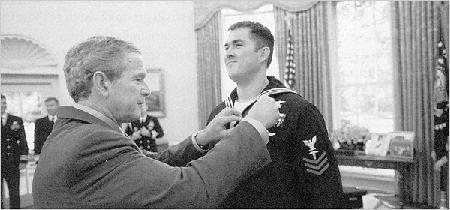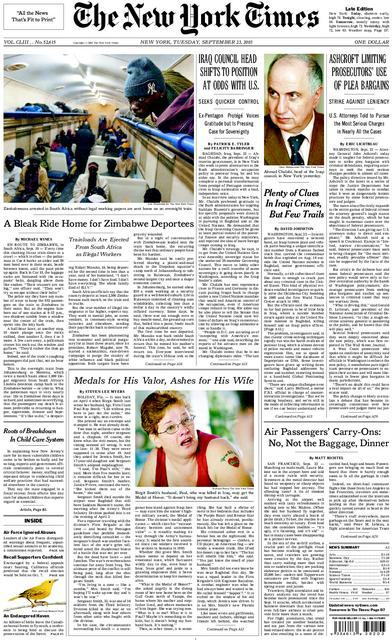What explains the New York Times’ ten-day delay in reporting that U.S. Navy SEAL Lt. Michael P. Murphy would be posthumously awarded the Congressional Medal of Honor? The short answer is some people never change. Thirty-five years ago, when the Times’ Arthur “Pinch” Sulzberger Jr. was asked by his father about his preference should an American soldier run into a North Vietnamese soldier, antiwar activist “Pinch” responded, I would want to see the American get shot. It’s the other guy’s country.”
Today’s Times has its heroes: the mere names of the dead — their deeds left unsaid — with their words parsed, the anguish of their families, and the predisposed antiwar rhetoric of a very few. Before October 11, 2007, the day the White House announced Lieutenant Murphy’s award, the Times had already written all of what it wanted to say about him. They have “fixed” the news about the War on Terror’s fallen heroes and misrepresented them in their commentaries to further the long-held political agenda of the newspaper’s chairman and publisher. This dates back to the early days of the fights in both Afghanistan and Iraq.
In a May 25, 2002, article entitled U.S. Review of a Deadly Afghanistan Battle Finds Lapses Eric Schmitt slipped in the fact that John Chapman and Jason Dean Cunningham “died” yet they were not the story; the story was “lapses” had resulted in the deaths of seven Americans. Yet nothing in that report supported such an allegation. Here is how one senior officer put it:
It’s very difficult, sitting in an air-conditioned environment with good lighting, to fully appreciate all that happens on the battlefield,” said Gen. Peter Pace, the vice chairman of the Joint Chiefs of Staff, who commanded a marine platoon in Vietnam. ”It is an enormously complex, chaotic environment — people shooting at you, things going ‘bang,’ vision obscured, and there’s a lot of things that you don’t even know about.
Those who get their “news” about the War of Terror from the Times will likely never learn that several months later Technical Sergeant John Chapman and Senior Airman Jason Dean Cunningham were both posthumously awarded the Air Force Cross for their actions that day.
On September 23, 2003, the Times launched a preemptive strike upon President Bush by using on their front page the still grieving widow of a soldier who died in Iraq just five months earlier, while relegating the heroism of Sergeant First Class Paul R. Smith — that saved many and produced the War on Terror’s first Congressional Medal of Honor — to an inner page:
In a 2,700-word article, the Times freely quoted the feelings flowing from Birgit Smith’s broken heart. But for what purpose? To be fair, off their front page, the Times did use 301 words to describe Sergeant Smith’s heroism yet most of the article was an emotional debate, using Mrs. Smith, about the then sixth-month old war in Iraq.
“What is the Medal of Honor?” she asked angrily in the dining room of her new home here on the Gulf Coast north of Tampa, the home where his mother and stepfather lived, and where memories of him linger. She was crying now. “What is it to me? What is it to Paul? Maybe it’s something to the kids, but it doesn’t bring my husband back. It’s nothing.”
…
She has heard rumors about shortages of food during the war — and ammunition.“Did they send the guys in there without enough stuff?” she asked. ”Did they know what they needed? It just makes me angry. They thought they had it easy. I think Bush thought it’d be easy — in-and-out easy. He was wrong and he knows that now.”
She began to cry. “I don’t get it,” she said, angrily, the doubts surfacing again. “There was so much shooting and Paul has to stand up and shoot by himself. Maybe if there were others shooting, he wouldn’t have died.”
Eighteen months later, just a few days before the Congressional Medal of Honor was awarded, the Times finally wrote a straight report about Sergeant Smith’s actions. Yet they relegated that report to page A12, this is what their front page contained, and this sole passage about Birgit Smith ended up at the very bottom of the article:
Reached at her home in Holiday, Fla., on Tuesday, Sergeant Smith’s widow, Birgit, expressed gratitude. “I’m proud and honored that Paul would be recognized by his country in such a meaningful way,” she said in a telephone interview. “He loved his country; he loved the Army; and he loved his soldiers.”
Further forward in the Times that day, in their World section, they published a Reuters story about Abu Ghraib; it was their 901st article/commentary about the abuses there since the Times broke the story fourteen months earlier. Go figure.
While there are literally thousands of untold stories, the Times has named (or alluded to) one fallen soldier many times without ever mentioning his support for the war in Iraq and sacrifice in the service of others. An advanced search of their archives using the keywords ‘Cindy+Sheehan’ reveals 155 entries. Read them and you will discover that her son “died in Iraq,” “was killed in Iraq,” or “was killed in an ambush in Iraq.” What you will not read there about Specialist Casey Sheehan is he volunteered to rescue fellow soldiers who were pinned down by enemy fire, replied, “Where my Chief goes, I go,” when told he did not have to volunteer, and was posthumously awarded the Bronze Star for his valor. Once, the Times’ Frank Rich almost mentioned all that in his column entitled The Swift Boating of Cindy Sheehan, published on August 21, 2005:
The public knows that what matters this time is Casey Sheehan’s story, not the mother who symbolizes it. Cindy Sheehan’s bashers, you’ll notice, almost never tell her son’s story. They are afraid to go there because this young man’s life and death encapsulate not just the noble intentions of those who went to fight this war but also the hubris, incompetence and recklessness of those who gave the marching orders.
Specialist Sheehan was both literally and figuratively an Eagle Scout: a church group leader and honor student whose desire to serve his country drove him to enlist before 9/11, in 2000. [all emphasis added mine] He died with six other soldiers on a rescue mission in Sadr City on April 4, 2004, at the age of 24, the week after four American security workers had been mutilated in Falluja and two weeks after he arrived in Iraq. This was almost a year after the president had declared the end of “major combat operations” from the aircraft carrier Abraham Lincoln.
When Mr. Rich almost told “her son’s story,” he clearly missed another opportunity to say Casey Sheehan reenlisted long after 9/11 knowing that he would deploy to Iraq.
Also deliberately omitted from the front and inner pages of the Times are these words by Marine Corporal Jeffrey B. Starr:
“I don’t regret going, everybody dies but few get to do it for something as important as freedom. It may seem confusing why we are in Iraq, it’s not to me. I’m here helping these people, so that they can live the way we live. Not have to worry about tyrants or vicious dictators. To do what they want with their lives. To me that is why I died. Others have died for my freedom, now this is my mark.”
The examples are plentiful. The Times named a hero and used her to spark a discussion about women in the military. When an election was nearing and the polling in a swing state was close, the Times “reported” on a vitriolic debate there among the families of the fallen. After the Times’ preferred political party lost the 2004 election, a two thousand-word discussion between the families of the fallen about the war in Iraq — some pro but mostly con — broke out on their front page.
Since 9/11, on all battlefields, more than 4,000 American soldiers, sailors, airmen, and Marines have earned and been awarded the top six medals for valor, the Bronze Star with ‘V’ device and higher. Conversely, the Times has written and published but four straight stories about the battlefield heroics of the War on Terror’s most highly decorated troops — and not one time has even their heroism made the Times’ front page.
So, what earlier Times article about Lt. Michael Murphy did most people miss?

On August 9, 2007, Motoko Rich (no apparent relationship to the Frank Rich) wrote a book review about Marcus Luttrell’s Lone Survivor as it was then number one on the New York Times bestsellers’ list. In her review, Ms. Rich wrote some stunning things:
* Yet backed by strong support from military blogs and right-wing pundits like Michelle Malkin…
* Mr. Luttrell’s story, involving a failed mission to capture or kill a Taliban leader in the mountains of Afghanistan, is unusually dramatic…
* Along with the tragic story about how Mr. Luttrell lost his comrades, the book is spiked with unabashed braggadocio and patriotism, as well as several polemical passages lashing out at the “liberal media” for its role in sustaining military rules of engagement that prevent soldiers from killing unarmed civilians who may also be scouts or informers for terrorists…
* Mr. Luttrell said he would occasionally nudge Mr. Robinson toward accuracy…
* Mr. Robinson said he eventually got to be a better mimic…
Perhaps Ms. Rich had never actually read Lone Survivor for she failed to describe the actions on June 28, 2005, of Lieutenant Murphy, hell; she did not even mention his name. Surely, she knew that he had been nominated for the Medal of Honor and all three of his comrades (Luttrell, ST2 Matthew G. Axelson, and GM2 Danny P. Dietz) (also see this) had previously been awarded the Navy Cross.
Yet, most stunning of all, two months later the Times silently let a book review stand as their sole opinion of him for ten days, while every other major New York metropolitan area based newspaper immediately featured Lieutenant Murphy and wrote about him in glowing terms.
Some people never change. Last May, Arthur “Pinch” Sulzberger Jr., said this within his commencement address at the State University of New York’s New Paltz campus:
When I graduated from college in 1974, my fellow students and I had just ended the war in Vietnam and ousted President Nixon. OK, that’s not quite true. Yes, the war did end and yes, Nixon did resign in disgrace — but maybe there were larger forces at play. Either way, we entered the real world committed to making it a better, safer, cleaner, more equal place. We were determined not to repeat the mistakes of our predecessors. We had seen the horrors and futility of war and smelled the stench of corruption in government. Our children, we vowed, would never know that. So, well, sorry. It wasn’t supposed to be this way.”
During all of this War on Terror, the New York Times has furthered its political agenda by using the names of the fallen, nearly ignoring their heroism, parsing their words of support for the fights they volunteered for, and promoting the antiwar rhetoric of a small number of their family members.
Some people here still prefer that America’s sons and daughters do the dying.



2 comments for “NY Times names WOT’s dead; tosses their heroism”